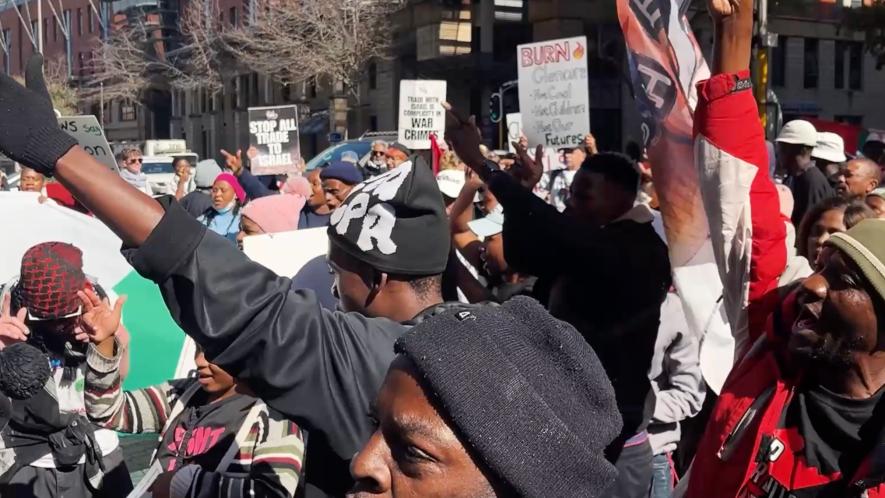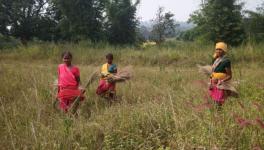Colonial Mining Fuels Israeli Genocide: Global Protests Target Glencore

Allies take place outside Glencore offices ahead of Annual General Meeting in Switzerland. Photo: Screenshot
In a protest against Glencore, one of the world’s largest mining conglomerates fueling Israel’s genocide in Gaza and devastating the environment of the local communities in the mining towns in Africa and South America, activists organized a global day of action on Wednesday, May 28.
Demonstrations were reported in South Africa, Colombia, Peru, Germany, and Switzerland, where the Anglo-Swiss multinational held its Annual General Meeting (AGM) that day.
The company’s shareholders have gathered in Switzerland “to celebrate the record profits” it makes by extracting and transporting coal to “the genocidal state of Israel” where it is “used to fuel the killing machine,” Socialist Youth Movement member Zaki Mamdoo told Newzroom Afrika.
He was a part of the march to Glencore’s South Africa head office in Johannesburg, where a demonstration was organized by Palestine solidarity activists, trade unionists, and other civil society groups.
“Glencore is directly fueling Israel as they commit their genocide against the people of Palestine,” said South African Jews for a Free Palestine, describing Glencore’s owners as “some of the most complicit individuals in Johannesburg.”
“The air is dark. The trees are dark. The soil is dark.”
In the meantime, the environmental destruction, especially by its coal mining operations in South Africa, DR Congo, Peru, and Colombia, is devastating the health and livelihoods of the local communities.
“That is the reason most of the people taking part in these demonstrations alongside the activists were the people from the mining-affected communities,” Mametlwe Sebei, president of the General Industries Workers Union of South Africa (GIWUSA), told Peoples Dispatch.
In mining areas like Witbank, “the entire city is covered in dark clouds. The air is dark. The trees are dark. The soil is dark,” he said, adding that the resulting health ailments beginning with lungs have killed hundreds of residents and mine workers paid survival wages.
“Colonial mining”
Leaving such devastation behind, coal mining by Glencore and other multinationals does not contribute anything to the South African economy, beyond the pittance paid to cheap black immigrant labor hired to work in the mines, Sebei emphasized.
Mostly exported raw, the mining of these minerals does not create any jobs upstream in processing and manufacturing. This kind of “colonial mining” has not brought any development, he added.
“It has not brought any healthcare or education to people affected. It has not resulted in the improvement of any public infrastructure, except the roads needed to take out the minerals.”
He went on to observe that it is this same predatory extractivism that drove the imperialist powers to set up the genocidal settler colonial project of Israel, as a means to exert control over West Asia to monopolize its oil reserves that “are critical for modern industrial capitalism.”
Struggle for a free Palestine is intrinsically connected to class struggle in South Africa
Glencore is at the confluence of worker exploitation, environmental destruction, and genocide, all driven by the same logic of “imperialist extractivism”, Sebei said, explaining why the struggle for a free Palestine is intrinsically connected to the class struggle in South Africa.
The Congress of South African Trade Unions (COSATU), the country’s largest trade union federation affiliated with the ruling African National Congress (ANC), has also echoed such analysis in its statement backing the demand that Glencore stop coal exports from South Africa to Israel.
“The war on Gaza” is “directly related to the desperation for energy control by the monopolies. This is why the struggle for a free Palestine is at the same time a struggle for a new, just, and democratic economic model of development for humanity as a whole,” read its statement last year, when 200 unionists and other activists protested outside Glencore’s office in Johannesburg.
“22% of its [Israel’s] energy comes from coal. Glencore is the biggest coal mining company here sending coal to Israel. So we’re calling today on our government to end coal sales to Israel,” South African BDS Coalition coordinator Roshan Dadoo said at this demonstration in August 2024, two days after the progressive government of Colombia had banned coal exports to Israel.
“Given the fact that the International Court of Justice has ruled in January… that there’s a plausibility that Israel is committing genocide… what is Glencore doing to review its relationship with Israel,” asked a shareholder proxy during Glencore’s previous AGM in Switzerland in May 2024.
“Do you recognize that maintaining such a business relationship could lead to people thinking that Glencore is aiding and abetting a potential genocide and that this could lead to criminal liability?”
Glencore’s chairman Kalidas Madhavpeddi had dismissed her question, saying that it had “no merit at all.” But she persisted, asking if Glencore was “conducting human rights assessments on the use of the coal you’re exporting to Israel to ensure that you’re not held liable.”
Replying that “the company supplies to many countries around the world,” Madhavpeddi said “It’s almost impossible to tell you the answer to your question,” refusing to field further questions from her.
Expropriate!
“In many ways, they are doing what they are supposed to be doing – extracting record profits. That is by design… that is what they are set up to do,” Mamdoo, who is also a member of the Workers and Socialist Party, added in his news byte from the demonstration on Wednesday.
“So when we are dealing with Glencore” the halt of South African coal export to Israel is an immediate demand because “people are dying in their hundreds day in and day out, children are being burnt alive” and starved to death.
“But the struggle doesn’t end there. Ultimately we need to be moving toward the expulsion and expropriation of Glencore and all companies like it” so that the means of production it now privately owns can be used to cater to South African people’s developmental needs, rather than a genocide abroad.
Get the latest reports & analysis with people's perspective on Protests, movements & deep analytical videos, discussions of the current affairs in your Telegram app. Subscribe to NewsClick's Telegram channel & get Real-Time updates on stories, as they get published on our website.
























